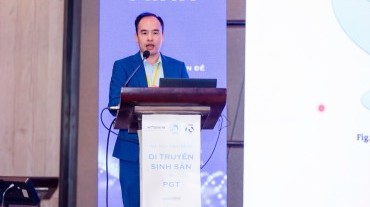
Andrology is still a hot topic today for clinicians as well as infertile couples because the impact of male infertility on male reproductive health accounts for 40-50%. After many online broadcasts on the topic of male infertility, GENTIS has received a lot of positive feedback and responses from the audience.
Following this series of successes, GENTIS is pleased to discuss with a leading expert and many years of clinical practical experience in andrology, that is: MSc Duong Quang Huy - Specialist in Andrology & Infertility Ho Chi Minh City with the topic "WARNING CAUSE OF Male Infertility - Loss of AZF segment".

According to Dr. Huy at the seminar, the current situation of infertility in Vietnamese families is increasing, accounting for about 10-12% of couples of reproductive age (According to Dr. Ministry of Health). In particular, Following this series of successes, GENTIS is pleased to discuss with a leading expert and many years of clinical practical experience in andrology, that is: MSc Duong Quang Huy - Specialist in Andrology & Infertility Ho Chi Minh City with the topic "WARNING CAUSE OF Male Infertility - Loss of AZF segment".male infertility accounts for up to 40% and there are many causes for it.
Besides a number of causes such as high heat work factors, radiation…; environmental factors; having male diseases…, genetic factors causing azoospermia or azoospermia is one of the most common causes.
Male infertility specialist said that until now, almost all male infertility cases were ordered to carry out chromosomal (chromosomal) related tests. However, in some cases, the chromosomal mutation causes the loss of a small gene on the Y chromosome, making it undetectable by conventional methods. Then we will need to perform AZF gene testing to detect mutations in the Y chromosome, find out where the deletion is on the Y chromosome or whether there is a repeat or an inversion.
THE STATUS AND IMPACT OF AZF on male reproduction
AZF stands for Azoospermia Factor and this region contains many genes involved in spermatogenesis. Deleting mutations occurring in the AZF region often lead to consequences with varying degrees of impact, such as azoospermia, oligospermia, severe oligospermia, disorders in spermatogenesis, or sperm abnormalities. .
According to Dr. Huy, the AZF mutation accounts for 1/2000-3000 in the world population and accounts for a very large proportion of over 7% for male infertility patients who have a semen analysis without sperm. There are four types of AZF deletions, and the effects of each deletion cause different mutations and abnormalities.

AZFa region: A complete deletion in the AZFa region means that sperm cannot be retrieved from the testes for ICSI.
Experts shared that AZFa deletion is quite rare, surgery will not find sperm in this case. Since there is no chance of having a baby from his own sperm, male patients should perform a sperm request for IVF.
AZFb region: Partial deletion of the AZFb region is associated with abnormalities in spermatogenesis. Small deletions in the AZFb region with seminal spermatogenesis (SGA) phenotype
According to Dr. Huy, there are 10-15% of cases of AZFb deletion with poor sperm production, depending on the examination case, it is advisable not to intervene to find sperm to do IVF.
AZFc region: AZFc deletion can show a relatively diverse phenotype, ranging from normal sperm levels, oligospermia, severe oligospermia or azoospermia.
• The highest incidence of AZFc deletion, about 85% as shared by Dr. Huy. Clinical manifestations of AZFc deletion include azoospermia, motility, or less than normal sperm count.
• In men with azoospermia due to AZFc deletion, about 70% still have a chance to find sperm using TESE technique and be able to give birth using ICSI method.
• Loss of AZFc segment alone should only be treated to obtain sperm until eligible for assisted reproductive technology, medical treatment to the extent that natural pregnancy can be achieved without assisted reproduction is ineffective.
AZFd region: This region has a higher rate of deletion mutations than other regions in patients with infertility due to azoospermia or severe oligospermia with abnormal sperm morphology. Therefore, identifying AZFd deletion also means that men in a state of infertility are not severe, the treatment is better than AZFa, AZFb and AZFc deletion, but most still need fertility support.
AZF EXAMINATION PROCEDURE AND INSTRUCTIONS
Discussing at the seminar, Doctor Duong Quang Huy emphasized the need to learn the medical history of men and directly examine the male genitals in the male infertility examination process. For the cases of semen analysis without sperm, testicle size is smaller than normal, FSH is significantly increased, testosterone is decreased, etc., it is necessary to specify more in-depth genetic tests.
According to the World Health Organization (WHO), according to the European and American Association of Urology, the AZF test should be performed for men with a sperm concentration of less than 15 million sperm/ml, accompanied by clinical symptoms examination as above.
In some cases, if a man has been examined and determined to have another condition such as sperm blockage, he may not need an AZF test. The doctor also noted with male patients, if AZFc is not detected early, from low sperm count, it can lead to azoospermia and can no longer take sperm for IVF.

To evaluate the significance and importance of performing the test always requires research and scientific evidence. The male and female expert shared that, since 1992, the researches on AZF were first published and received much controversy. To date, there have been more than 900 studies on how AZF affects men, how it affects conception, how it affects men's lives, is it inherited to the next generation... Some typical examples research on AZF such as:
- M.B. Shamsi et al (2011), “Genetic and epigenetic factors: Role in male infertility”
- Vollrath, Foote D, Hilton S et al (1992). The human Y chromosome: A 43-interval map based on naturally occurring deletions. Science, 258, 52-59
- Liu XG et al (2016), “Correlation between Y chromosome microdeletion and male infertility”
Thanks to these worldwide studies, in Vietnam in recent years, fertility doctors and gynecologists have had a more accurate view of the effects of AZF, thereby planning diagnosis and treatment. the right direction for the patient.
Doctor Duong Quang Huy further emphasized that analysis of AZF deletion cannot use the usual Karyotype method because it can only evaluate the number and structure of chromosomes, it is necessary to use PCR method. to amplify the male DNA, combining the use of primers (kit test) and electrophoresis to detect AZF deletions on the Y chromosome. Dr. Huy noted the importance of the test procedure. Labs need to follow the regulations and choose the right primer test kit to avoid false positives/negatives.
Sharing at the end of the seminar, Dr. Huy highly appreciated GENTIS in the implementation of the male test kit in general and the AZF test in particular. “In my opinion, GENTIS's AZF result sheet has reached all the required index thresholds for doctors to give directions for indications, diagnosis and treatment of patients. When implementing the expanded AZF test package, there will be more comprehensive and comprehensive result index thresholds. In addition, GENTIS result information is carefully sent back to the email to the doctor and the patient.”
 GENTIS Company is proud to be the unit that develops a full and complete set of male tests for more than 30 fertility support units across the country. Compared to other units, GENTIS has always proven to be different and superior in technology and ensures the accuracy of AZF tests. By PCR technique to amplify specific DNA fragment combined with capillary electrophoresis system, AZF test results at GENTIS ensure adequate index threshold with AZFa, AZFb, AZFc, AZFd regions.
GENTIS Company is proud to be the unit that develops a full and complete set of male tests for more than 30 fertility support units across the country. Compared to other units, GENTIS has always proven to be different and superior in technology and ensures the accuracy of AZF tests. By PCR technique to amplify specific DNA fragment combined with capillary electrophoresis system, AZF test results at GENTIS ensure adequate index threshold with AZFa, AZFb, AZFc, AZFd regions.
Hopefully, with the test that GENTIS deploys with male infertility patients, doctors will have a better direction to diagnose and treat the disease, and soon bring happiness to the infertile family. The useful information that Ths.BS Duong Quang Huy shared in the program "You ask - Expert answers" this time has contributed to providing knowledge about male infertility and loss of AZF segment to men. and infertile families. GENTIS promises to continue to bring more programs to serve doctors and customers.











